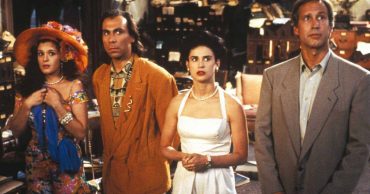The New York Times got a lot of people talking in late June, 2025. The prestigious outlet made it their mission to find out the 100 greatest movies of the 21st century. To do so, they surveyed over 500 directors, actors, critics, and other Hollywood professionals, asking them to name the best movies released since 2000. The result was an authoritative list that sparked countless debates and water cooler conversations across the film world.
While many of the rankings were totally expected – Oscar darlings like Parasite, Moonlight, and There Will Be Blood all secured well-deserved high spots – others caused moviegoers to double-take the list. Nestled between arthouse vehicles and critically acclaimed dramas were some genuinely surprising entries that proved Hollywood’s tastemakers have a broader definition of “greatness” than many would assume. From raunchy gross-out comedies to zany romcoms that shouldn’t work but absolutely do, these surprising selections remind us that cinematic excellence comes in all shapes and sizes. So, here’s our pick of the 5 most surprising films that made the cut.
5. Superbad (2007) – No. 100
Superbad landing the number 100 spot is surprising but totally warranted. Where the shock comes in is with the fact that comedy movies often get snubbed by critics. However, when a movie is as self aware as this, it can stand out amongst the rest. Superbad never set out to be an Oscar-winning picture, but it did set out to flip the teen comedy genre on its head. Perhaps the reason this worked so well is that the script was written by two writers (Seth Rogen and Evan Goldberg) who were actually teenagers when they began scribing the project. In fact, many of the events in the film are inspired by real-life mishaps and misadventures from the duo’s own coming-of-age story in Canada.
With that said, rarely has a gross-out R-rated comedy felt so unique and relatable. So, it’s rather easy to see why Superbad still holds up today as one of the finest of its kind. Renowned talents like Julianne Moore, Eric Roth, Shea Wingham, Joe Wright, and Mike Birbiglia included it in their voting for the 100 greatest movies of the 21st century.
4. Minority Report (2002) – No. 94
There’s no arguing that fact that Steven Spielberg is one of the most iconic filmmakers in history. Ageing like a fine wine, he is still releasing box office hits and critically applauded movies of all genres well into his 70s. Released in 2002, Minority Report is an example of his ability to appease to both audiences and critics. This sci-fi mind-bender grossed over $358 million worldwide against a production budget of $102 million. It was also widely praised by some top critics. So, why is it surprising that this made The New York Times 100 Greatest Movies of the 21st Century list? Because it beat other Spielberg movies that feel much more iconic and timeless.
Minority Report is by no means a bad movie, or an overrated one. It’s unique, pressing, thought-provoking, well-paced, and exhilarating. What makes its inclusion truly shocking is what it left behind. Spielberg’s more traditionally acclaimed films like Catch Me If You Can, with its charming cat-and-mouse dynamic and Leonardo DiCaprio‘s magnetic performance, failed to make the cut. Neither did the weighty historical drama Munich, which tackled complex themes of revenge and morality in the aftermath of the 1972 Olympics tragedy. Lincoln, despite Daniel Day-Lewis‘s transformative Oscar-winning performance and its masterful depiction of political manoeuvring during the Civil War, was overlooked. Simply put, for an artist of Spielberg’s stature and prolific output this century, his representation on the list feels surprisingly thin.
3. The Tree of Life (2011) – No. 79

Terrence Malick‘s sweepingly poetic and contemplative epic The Tree of Life is a basic story that relies heavily on intense character studies, all while exploring the origins of life, the universe, and human existence through the lens of a 1950s Texas family. Despite its critical acclaim – evident in its 85% rating on Rotten Tomatoes and major Oscar nominations for Best Picture, Best Director, and Best Cinematography – wider audiences were seemingly unprepared to devote 139 minutes to such an abstract and meditative experience. This disconnect was reflected not only in its lower audience score of around 60%, but also at the box office, where it brought in a lukewarm $58.4 million worldwide against a $32 million budget.
However, this Brad Pitt-led melodrama on steroids appears to be a film that has aged gracefully, finding new appreciation among viewers willing to surrender to its dreamlike rhythm and philosophical ambitions. Perhaps, what initially felt polarizing and pretentious to some has revealed itself as a genuinely transcendent piece of cinema – a slice of basic cinema that dares to ask the biggest questions about why we exist and what it all means. Its position on The New York Times’ prestigious list suggests that industry professionals have come to recognize Malick’s audacious vision as essential viewing, proving that sometimes the most challenging films are the ones that endure longest in our collective memory. It may be too soon to tell, but we could potentially have another flop turned classic here, just like we saw with The Shawshank Redemption.
2. Bridesmaids (2011) – No. 32

Bridesmaids coming in at number 32 isn’t surprising because it’s not deserving, nor is it surprising because it wasn’t succesful. It’s surprising because at the time of its release, it was heavily vended and lauded as a female version of The Hangover. So, the shock here comes from the fact that The Hangover didn’t make The New York Times’ list. Ultimately, both movies deserve a spot, however, Bridesmaids is the movie that landed Oscar nominations – Best Supporting Actress for Melissa McCarthy and Best Original Screenplay for Kristen Wiig and Annie Mumolo.
What made Bridesmaids so deftly groundbreaking was its willingness to let women be just as crude, messy, and flawed as their male counterparts in raunchy comedies. The film didn’t sanitize female friendship or present women as perpetually put-together – instead, it showcased the raw, sometimes ugly realities of adult relationships, financial stress, and personal insecurity. With Paul Feig‘s razor-sharp direction and a stellar ensemble cast, Bridesmaids proved that female-driven R-rated comedies could be both commercially successful and critically respected. It’s easy to see why so many industry professionals picked this for their rankings -it didn’t just entertain, it shifted the entire landscape of what Hollywood comedies could be.
1. Anchorman: The Legend of Ron Burgundy (2004) – No. 85
Another wacky comedy that shocked readers of The New York Times when its name popped up was Anchorman: The Legend of Ron Burgundy. What’s so surprising about this is the fact that Will Ferrell isn’t exactly an actor that resonates with critics. Yet, he clearly strikes a chord with his peers. Although an eccentric, foul-mouthed, and at times, utterly gross comedy making its way to this list is surprising, it goes to show that we all need a good laugh from time to time.
Where another shock comes from is that Ferrell has two iconic comedies to his name that seem to increase in popularity with every passing year – Anchorman and Step Brothers. Both of which have had comedy lovers begging for sequels. Anchorman 2: The Legend Continues delivered, but Step Brothers 2 has never come to fruition, meaning Anchorman: The Legend of Ron Burgundy could really be one of the most-loved comedies of all time. And one things for sure, it’s certainly one of the most coveted comedy flicks of the 21st century, with a number 85 spot to show for it.
Read Next: Five Underrated Comedies With Bad Rotten Tomatoes Scores
 Follow Us
Follow Us





